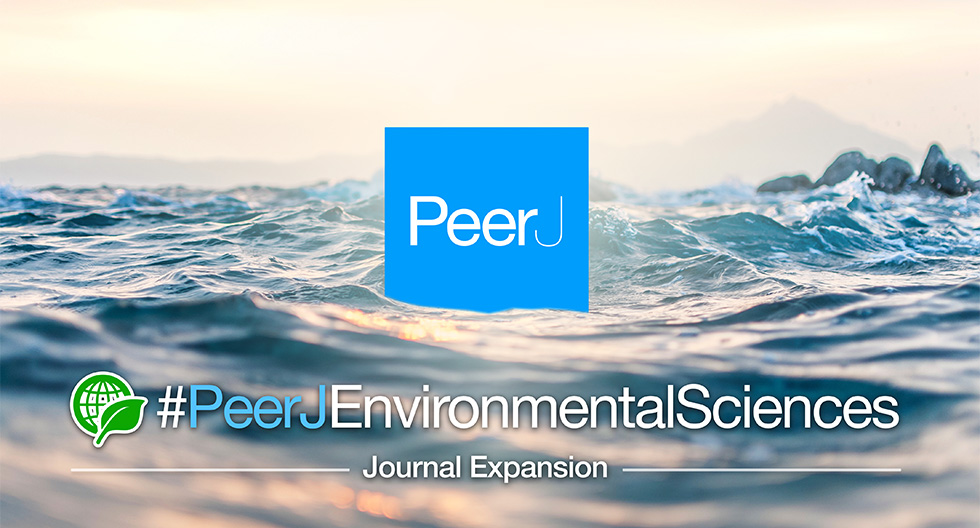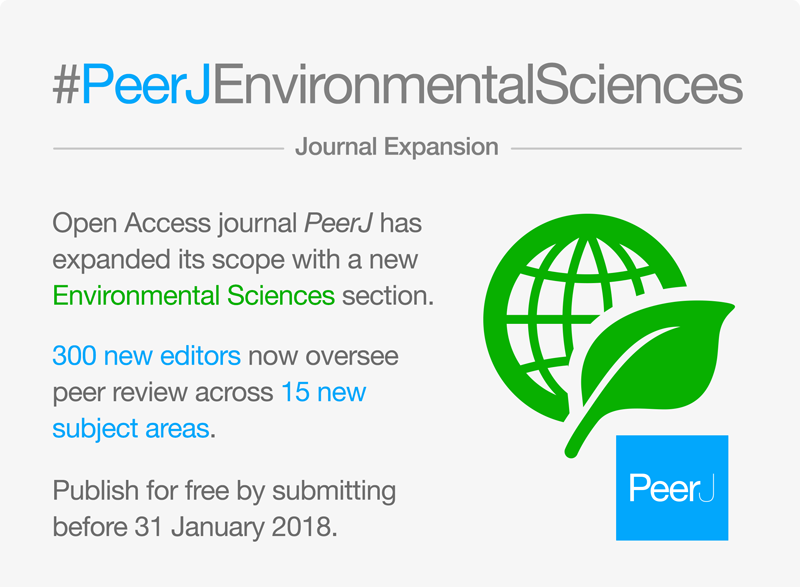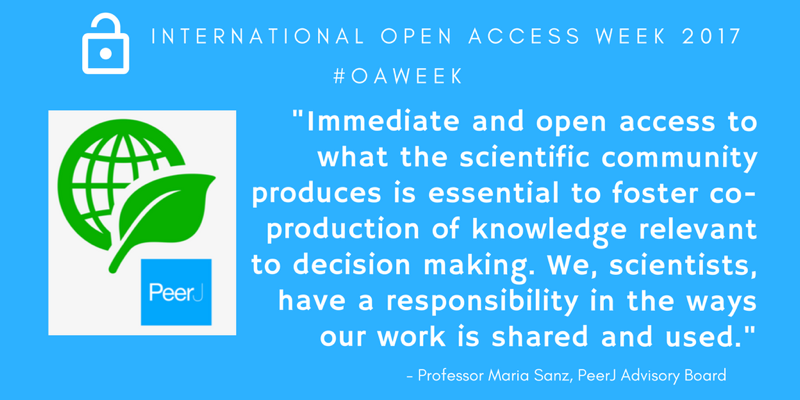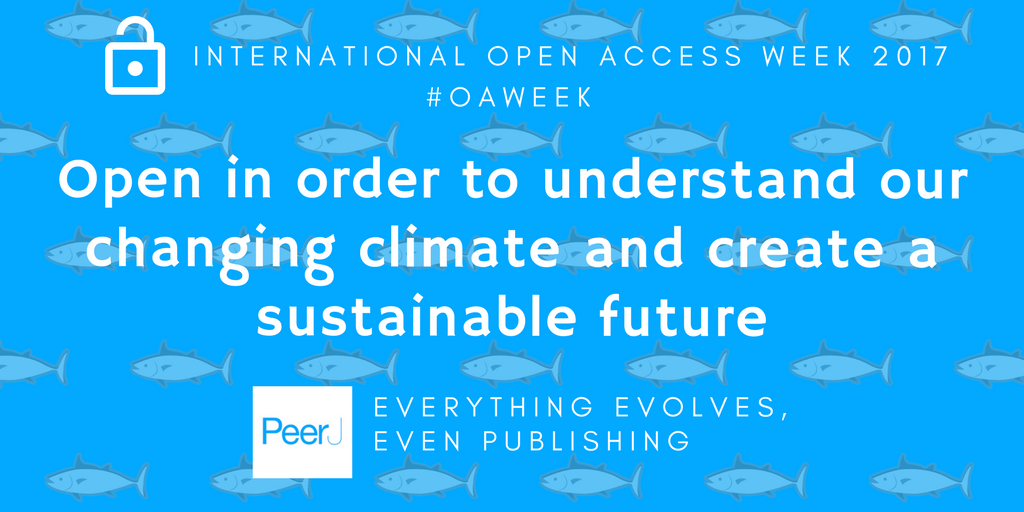
International Open Access Week is a great time for the scientific community to reflect on how open access to scientific research is making a difference and what we, at PeerJ, can do to ensure momentum rapidly continues for wider access around the world. We are thrilled to be able to share some exciting developments aimed at getting more authors engaged in sharing their research openly and giving more readers access to vital research necessary for addressing pressing global challenges.
We are announcing today the expansion of our journal PeerJ to explicitly include the Environmental Sciences. In the summer, we announced that we are now accepting submissions in the areas related to environmental science and climate change given its vital importance and the wide overlap with our existing scope. We received a strong, positive response when we added these areas and since then have been receiving requests to expand the journal to more comprehensively cover Environmental Sciences. With our roots firmly planted in research community-driven publishing, we quickly got to work to meet this evident research need.
Effective today, our expanded Environmental Sciences section is now up and running and researchers can submit manuscripts from a much wider range of subject areas. Because of our background in the biological and health sciences, we believe we can fill a unique role by focusing on those environmental sciences that have some relationship to anthropogenic effects, and which intersect with biology and human health. This is a strongly interdisciplinary field, in which open access to high-quality science for a global audience is crucial, now and in the coming decades.

To handle the breadth of new subject areas we have added over 300 renowned environmental science experts to our editorial board including Blanca Jimenez-Cisneros, Edward Maibach, David Stern, and Mark Osborn.
Professor Maria Sanz, PeerJ Advisory Board member and Scientific Director of the Basque Centre of Climate Change writes, “The need to respond to complex emerging questions on how to address urgent environmental issues, such as climate change, requires multi and transdisciplinary approaches. Immediate and open access to what the scientific community produces is essential to foster co-production of knowledge relevant to decision making. We, scientists, also have a responsibility in the ways our work is shared and used. New models and avenues are necessary to ensure science is valued and scientific production reaches society where and when it is needed.”
Our flagship journal PeerJ launched in 2013 as a speedy, low-cost, high-quality venue for peer-reviewed research across the whole of biology, medicine, and the health sciences. Over the years, and with the dedicated commitment of our editorial board and academic reviewers, we’ve published nearly 4,000 articles garnering a global reach of over 12 million views.

But we aren’t stopping there! To demonstrate our commitment in this field (and to actively seek submissions from this wider range of subject areas) we are waiving all article processing charges (APCs) in our new Environmental Sciences subject areas for the next three months. That means all new manuscripts submitted between today 24th October 2017 and 31st January 2018 that fall under the following subjects areas will be free to publish:
- Aquatic and Marine Chemistry – Natural and anthropogenic chemistry of fresh, salt, and groundwater environments including eutrophication, deoxygenation, pesticides, endocrine disruptors, ocean acidification.
- Atmospheric Chemistry – Natural and anthropogenic reactions and products including greenhouse gases, acid rain, photochemistry, ozone depletion.
- Biogeochemistry – Chemical cycles affecting or driven by biological activity (especially carbon, nitrogen, sulfur and phosphorus cycles).
- Biological Oceanography – How living organisms affect and are affected by, oceanic chemistry, physics, and geology.
- Biosphere Interactions – The intersection of biology with the atmosphere, geosphere, hydrosphere, pedosphere, anthroposphere, and similar.
- Climate Change Biology – Responses and influences of organisms, populations, and ecosystems under simulated, modeled or observed climate change.
- Ecohydrology – Ecological interactions involving water and the hydrologic cycle.
- Ecotoxicology – Effects of, and responses to materials in organisms, populations, and ecosystems. Includes resistance, tolerance, and degradation mechanisms.
- Environmental Contamination and Remediation – Characterization, monitoring, transport, transformation and fate of environmental contaminants.
- Environmental Impacts – Assessment and management of impacts of human activities and natural events (e.g. earthquakes, hurricanes, tsunamis) on the environment.
- Food, Water and Energy Nexus – A transdisciplinary research topic.
- Forestry – Conservation and management of natural and farmed forests.
- Green Chemistry – Chemical products and processes to reduce or eliminate hazards to health and the environment.
- Natural Resource Management – Characterization and sustainable management of natural resources such as soil, water, land, plants, and animals.
- Spatial and Geographic Information Science – Geocomputation and applied spatial statistics
We will also be moving a few old Biology subject areas to their new Environmental Sciences section home:
- Ecosystem Science – Interrelationships, functions, dynamics, and management of ecological communities.
- Soil Science – Formation, physico-chemical properties and management of soil as a natural resource.
- Coupled Natural and Human Systems – Interactions between human activities and the natural environment, also includes integrated geography.
Environmental Science is a field which we know is of great importance to understanding the global ecosystem and our role within it and we are looking forward to working with authors to make open access in this field a reality. With our focus on editorial efficiency and our mission to drive down the costs to authors (and free in new subject areas for the next three months!), we expect to witness the benefits of open environmental science in years to come.

Let us know what you think @thePeerJ. Looking forward to hearing from you!
*More details on how to claim the fee waiver: All submissions to our new Environmental Sciences subject area made between today 24 October 2017 and 31 January 2018 are eligible for a full fee waiver. Sign up for a free PeerJ account to start your submission to our peer-reviewed Biology, Health and Environmental Sciences journal PeerJ. In order to be eligible for the fee waiver, the manuscript must cover one of the fifteen new Environmental Sciences subject areas After initial checks, your manuscript will be taken on by one of our academic editors and will be sent off for peer review. All accepted manuscripts including one of the 15 new Environmental Sciences subject areas listed above will be manually issued with the full fee waiver. If any questions on this, please email [email protected]
